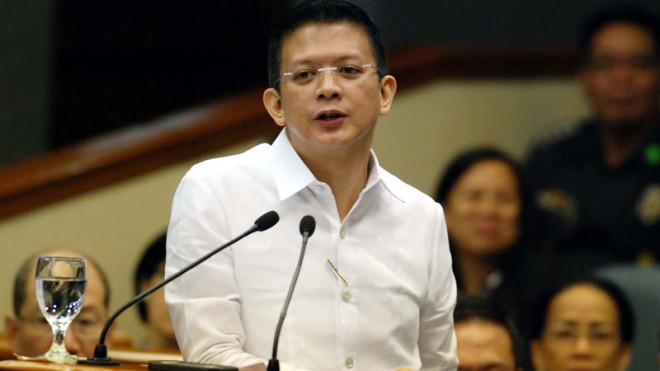Sen. Francis Escudero on Sunday insisted that the 2015 national budget had no pork barrel funds, saying that lawmakers can identify projects for funding but only before the budget is passed.
In a radio interview, Escudero, who chairs the Senate committee on finance, said there were indeed lump-sum appropriations in this year’s national budget but these were only for calamity funds and for maintenance and other operating expenses of government agencies.
Escudero was responding to the claim of former Sen. Panfilo Lacson that he and his team found at least P424 billion in lump-sum or discretionary funds in 11 of the 21 major line agencies in the 2015 General Appropriations Act.
Lacson said the lump-sum appropriations could be higher because his team had yet to finish its review of the budget.
Sen. Serge Osmeña III confirmed the lump-sum funds in the budget. He said pork barrel funds continued to exist in the budget despite a Supreme Court ruling declaring the graft-ridden Priority Development Assistance Funds (PDAF), a lump-sum budgetary item and a pork barrel, unconstitutional.
Osmeña said on Tuesday that the pork of members of Congress was back and that senators could identify projects worth at least P200 million. Some senators, he said, could identify projects worth P1 billion to P2 billion.
Pork projects are known to be sources of hefty kickbacks of lawmakers.
Osmeña said Malacañang had promised Congress that it could still identify projects placed in the budgets of different agencies.
He said lump-sum funds would also be found in the P3.02-trillion national budget for 2016 that Malacañang would submit to Congress.
Flexibility
“You need them (lump-sum funds). The government needs to be flexible,” Escudero told dzBB, citing instances when government needed to have such funds for calamities and disasters because it could not predict how much would be spent for relief and rehabilitation.
The chair of the finance committee noted that what the high court ruling on PDAF had prohibited was lawmakers itemizing projects after the budget had been passed or engaging in “postenactment intervention” as this would be tantamount to resurrecting pork barrel funds.
But the high court ruling did not say that the executive department was prohibited from engaging in postenactment intervention, Escudero said.
“If we will prohibit the executive—which is not stated in the ruling—who will identify the projects? It can’t be the Supreme Court. Only the executive could make this decision,” he said.
On Lacson and Osmeña’s assertions that lawmakers could identify projects, Escudero said this did not mean that the allocations for the projects were pork.
Such actions fell under a “preenactment intervention,” in which the lawmakers identified the projects during the budget deliberations and thus, were not violating the high court ruling, he said.
Escudero also said there were no ceilings to the costs of the projects when the lawmakers identified them.
He cited three lawmakers who identified certain projects—Sen. Pia Cayetano, who asked for the realignment of the budget of state universities and colleges; Sen. Loren Legarda, who sought more budget for the National Museum so that it could fix its building; and Sen. Grace Poe, who asked that the government’s feeding program cover all children and not only those who were suffering from malnutrition.
Escudero said he himself had suggested that the P1 billion allocated for the purchase of laptops be realigned so that it would cover fees for free public Wi-Fi.
“I can’t understand that these are pork but these are amendments to the budget,” Escudero said.
He added that these items were all detailed in the budget.–Christine O. Avendaño
